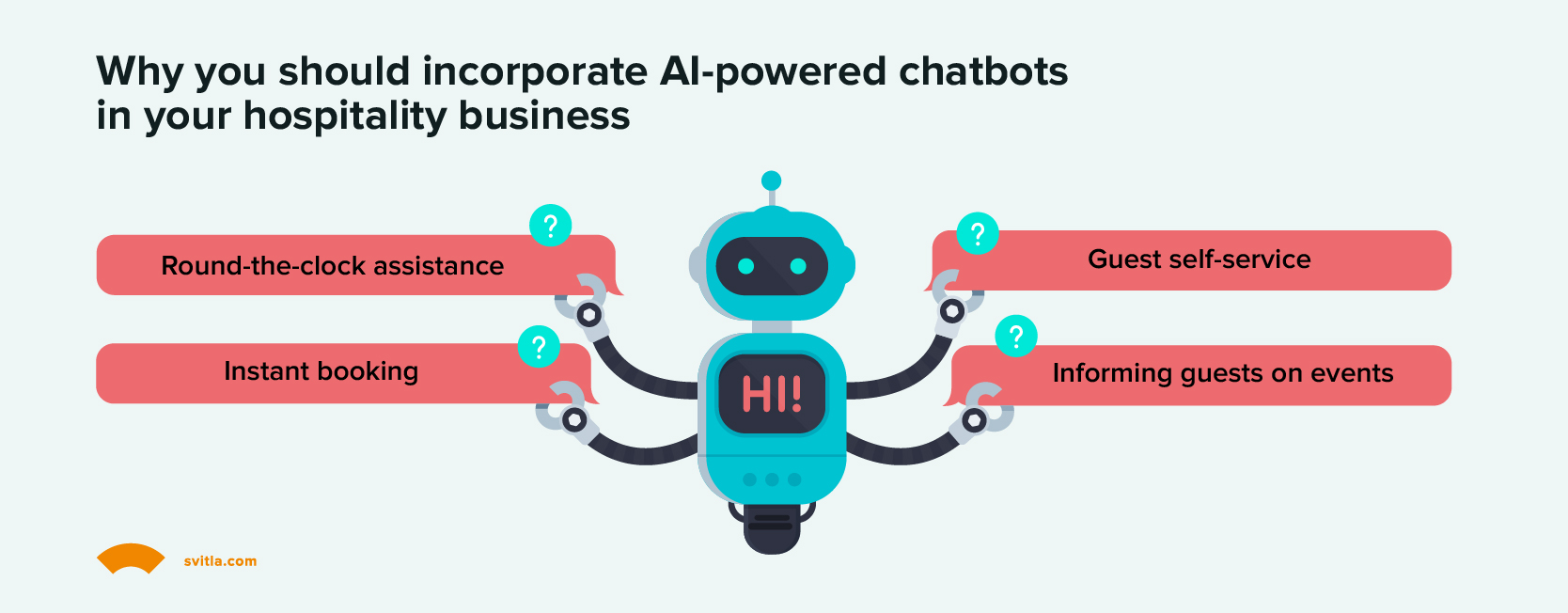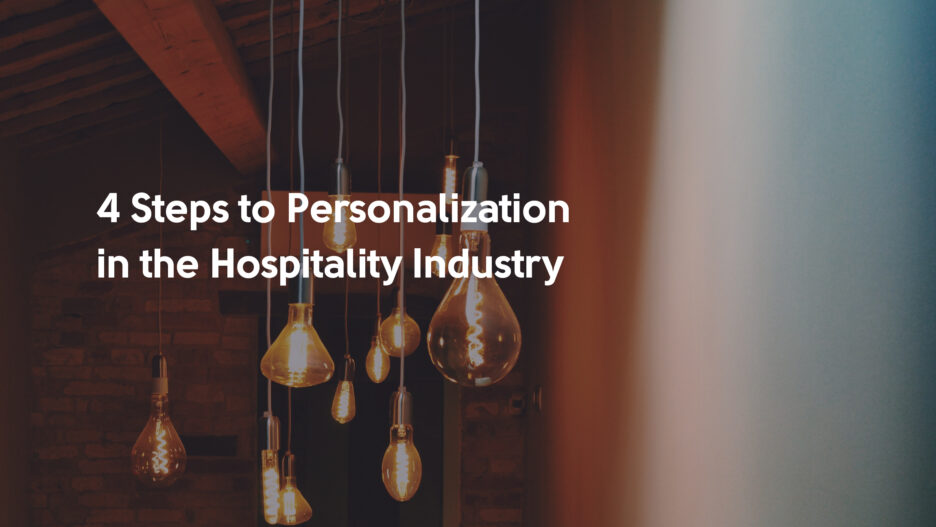In an age where travelers seek more than just a place to rest, the hospitality industry stands at a crossroads of innovation and guest-centricity. A profound shift has occurred in the way guests perceive their journeys, placing personalized experiences at the forefront of what they’re looking for.
Expedia's 2021 survey confirms that 54% of global travelers demand personalized encounters that cater to their unique interests and past behaviors.
In this article, we’ll shed light on the fundamental steps to personalization in the hospitality industry.
Join us as we delve into a world where personalized guest experiences are no longer a luxury but a necessity, a realm where the fusion of technology, data, and human touch creates a satisfying journey.
Personalization Trends in the Hospitality Industry: Harnessing Data Intelligence
Technology has enabled the hospitality industry to connect and access massive amounts of data. Its transformation is based on the meticulous analysis of customer data (Big Data) and advanced analytics powered by machine learning (ML) and artificial intelligence (AI).
According to a Hospitality Technology survey, 86% of hotels believe data analytics can boost revenue, while 77% believe it can enhance guest satisfaction. This compelling rationale has prompted prominent chains such as Hilton Worldwide and Marriott International to introduce expansive Data and Analytics (D&A) platforms on a global scale. These platforms provide guests with personalized encounters and targeted promotions, enhancing the overall guest experience.
Collecting and Analyzing Customer Data
McKinsey's research highlights a substantial advantage for businesses that adeptly harness personalization, yielding a remarkable 40% surge in revenue compared to those that overlook this strategy. Additionally, their findings underscore that personalization in the hospitality industry not only holds the potential to curtail Customer Acquisition Cost (CAC) by as much as 50%, but it also amplifies the efficacy of marketing expenditure by a notable 30%.
At the heart of personalized guest experiences lies the ability to truly understand guests, beyond their mere check-in and check-out details. With each interaction, guests leave a trail of data – preferences, behaviors, engagement patterns – that holds the potential to shape a profoundly tailored encounter.
The strategic collection of this data involves not only surveys and feedback but also the orchestration of touchpoints across the entire guest journey – from website interactions and booking details to in-stay activities and post-checkout reviews.
Real-Life Examples of Data-Driven Personalization in the Hospitality Industry
Recent McKinsey's findings underscore that 71% of customers actively seek personalized interactions from businesses, with an additional 76% expressing frustration when such tailored experiences are absent.
Furthermore, a significant 76% indicated that personalized messages play a crucial role in elevating their perception of a brand, while an impressive 78% acknowledged that such customized communication significantly boosts their inclination to make repeat purchases. In the hospitality sector, an overwhelming 70% of hotel guests attest to having notably enhanced experiences when hotels employ personalized approaches.
An illustrative case emerges from Marriott's loyalty initiative – Marriott Bonvoy effectively employs analytics to glean insights into guest preferences and behaviors. Thus, the hotel chain is able to curate tailored recommendations and extend personalized offers to its valued guests.
Another great example is Best Western which employs geo-targeting to send customized, location-based offers. For instance, it provides distinct recommended destinations depending on whether emails are opened in New York City or Los Angeles.
These tactics yield positive results. Recently, the hotel chain experienced a notable 143% surge in app downloads compared to comparable campaigns. Likewise, there was a 10% rise in email click-through rates for non-rewards members.
Virgin Hotels Chicago exemplifies a commitment to personalization in the hospitality industry, utilizing mobile tech to elevate guest experiences. Research indicates 40% of travelers stay connected via smartphones during trips, for various purposes such as staying in touch (29%) and accessing local info (24%).
With this insight, Virgin developed the “Lucy” app, enabling guests to personalize their stay via their devices. From adjusting room temperature to streaming content on hotel TVs and making dining reservations, 'Lucy' enhances the stay.
Virgin Hotels innovates further with “The Know” preference program. By completing an online questionnaire, guests customize their mini bar, share allergies, and even select a welcome cocktail — delivering exceptional, tailored experiences beyond traditional rewards.
Another example is the Rainmaker Group. The Rainmaker Group is a premier resident engagement and loyalty system. Through personalized interactions and feedback, residents earn points via automation, encompassing lease renewals, milestones, and referrals. By partnering with Svitla Systems, the Rainmaker Group modernized their technology stack and streamlined processes to mitigate risks and enhance quality.
As a result, the company now can deliver accelerated functionalities, superior, more personalized user experiences, improved performance, and reduced manual workloads. This aligns with strategies for personalization in the hospitality sector, emphasizing enhanced engagement and guest satisfaction.
Next, we’ll go over 4 steps highlighting personalized customer service in the hospitality industry that have proven to be effective.
1. Leveraging Property Management Software for Seamless Personalization
More than one of the key personalization trends in the hospitality industry, one of the pivotal tools in personalized guest experiences is Property Management Software (PMS), a digital powerhouse that not only streamlines operations but also serves as a repository of guest information, ripe for analysis and utilization.
Property management software is more than just a digital check-in system; it's a dynamic hub that connects various touchpoints of a guest's journey. From reservation details and preferences to check-in logistics and in-stay activities, PMS becomes the nerve center of guest information.
Do you want to customize or build your own hotel property management system? Check our exhaustive guide to PMS features.
Every interaction, every request, every preference – they all find their digital footprint within this comprehensive platform. The reservations made for spa treatments, room service orders, choice of beverages at the bar – every transaction becomes a piece of the puzzle that is the guest's profile. PMS acts as the custodian, allowing businesses to gain a holistic understanding of guest preferences, behaviors, and habits.
Seamless Analysis for Enhanced Personalization
The integration of PMS with data analytics tools empowers establishments to decipher patterns, identify trends, and extract actionable insights. By understanding when a guest is likely to book a spa treatment, when they prefer a specific room type, or even their preferred robe size, hotels can take personalization trends in the hospitality industry to the next level.
Finnair exemplifies the application of data analytics to enhance the customer journey. By proficiently predicting customer preferences, inclinations towards specific actions, and identifying optimal choices, the airline adeptly offers personalized and engaging options that resonate with passengers.
Personalized Offerings and Database Management
PMS allows hospitality businesses to orchestrate personalized offerings on a grand scale. From sending tailored promotional offers to recommending experiences that align with a guest's history, PMS empowers businesses to elevate the entire guest journey.
Moreover, PMS aids in the creation of a comprehensive database of guest profiles, complete with intricate details like robe sizes and dining preferences. This repository transforms the guest experience into a tapestry of thoughtfulness, where even the minutest preferences are acknowledged and catered to.
2. Elevating Experiences through Upselling Hotel Software
The art of upselling, when orchestrated with finesse, not only enhances a guest's stay but also fosters an environment of personalization and satisfaction.
Upselling hotel software enables hospitality businesses to:
- Curate and offer tailored suggestions, transforming a routine stay into an unforgettable experience.
- Weave personalization into every guest touchpoint: from recommending room upgrades that align with a guest's preferences to suggesting exclusive experiences based on their history.
- Extend post-stay interactions, where guests receive personalized offers and promotions for their next visit, further cementing their connection with the establishment.
Forecasting models in upselling software can recognize guest inclinations and behavioral trends, empowering hotels to provide tailored chances for upselling and cross-selling. By suggesting fitting enhancements or extra services, hotels can boost their average guest revenue.
3. Empowering Trip Planning with AI Chatbots
Among the transformative innovations, hotel chatbots stand out as the pioneers of proactive and personalized assistance. These virtual concierges not only change the way guests plan their trips but also enhance their overall journey. AI-powered hotel chatbots are at the forefront of this technological transformation, redefining how guests plan ahead with hotels.
Here are a few distinctive features of chatbots in the hospitality industry:
- Round-the-clock assistance. Unlike traditional concierge desks that are often bound by working hours and human limitations, chatbots operate round the clock, ensuring guests have access to assistance whenever they need it. This shift from reactive to proactive engagement empowers travelers to plan their trips on their terms, at their convenience.
- Instant booking. Chatbots can assist with booking reservations for restaurants, arranging transportation, and even curating personalized itineraries. Through a dynamic blend of data analysis and real-time interaction, hotel chatbots transform the guest's smartphone into a digital concierge, ready to assist every step of the way.
- Knowledge sharing. Guests can learn about local events, cultural experiences, and hidden gems from chatbots.
- Guest self-service. Guests can access personalized information and recommendations anytime, minimizing the need for traditional concierge services. Through AI's learning capabilities, chatbots evolve with each interaction, offering recommendations that continually align with the guest's evolving interests.
All in all, as guests embark on their journey to plan their trips, hotel chatbots become trusted 24/7/365 companions, offering insights, recommendations, and a touch of personalization in the hospitality industry that resonates deeply.

4. Crafting Personalized Loyalty Programs
The evolution of loyalty programs has transitioned from transactional to transformative. Modern loyalty programs embrace the uniqueness of each guest, adapting offerings based on their behaviors, preferences, and habits.
The key to achieving this level of personalization in the hospitality industry lies in harnessing the wealth of guest data accumulated through interactions and engagements. By leveraging this data, hotels can segment guests into distinct personas, understanding whether they are frequent business travelers, leisure-seeking couples, or families with children.
Marriott's enticing rewards initiative, Marriott Bonvoy Benefits, empowers members to exchange points for complimentary hotel stays, dining indulgences, and unique experiences. Beyond this, points can be earned through car rentals and flights, and even shared with loved ones. Additionally, members enjoy perks like complimentary Wi-Fi and exclusive rates.
This strategic points program operates seamlessly due to Marriott's adept utilization of customer insights. By delving into customer behaviors, the company crafts a truly individualized experience for every guest. As the depth of customer preferences becomes clearer, Marriott is adept at curating personalized rewards that resonate deeply.

Personalized Customer Service in the Hospitality Industry: A Loyalty Journey Beyond Expectations
Accenture states that there's a resounding call from 81% of consumers for brands to establish a connection, grasp their desires, and comprehend their requirements.
In the dynamic landscape of the hospitality industry, where guest expectations and preferences evolve rapidly, the art of personalization emerges as the cornerstone of success. From harnessing data intelligence to offering tailored suggestions, every facet of guest interaction is transforming, driven by the desire to create experiences that resonate on a deeply personal level.
As we've journeyed through the myriad ways of personalization in the hospitality industry, it's evident that this paradigm shift is not just a trend; it's a fundamental shift in the way we connect with guests. From leveraging technology to crafting tailored loyalty programs, the hospitality landscape is being painted with strokes of innovation and care.
At Svitla Systems, we understand the transformative power of technology-driven personalization in the hospitality industry. As a software development company at the forefront of innovation, we specialize in crafting solutions that elevate guest experiences, redefine operational efficiency, and drive revenue growth.
Reach out to Svitla Systems and share your vision, ideas, and objectives. Let's explore how our software development expertise can shape the future of your hospitality venture.





